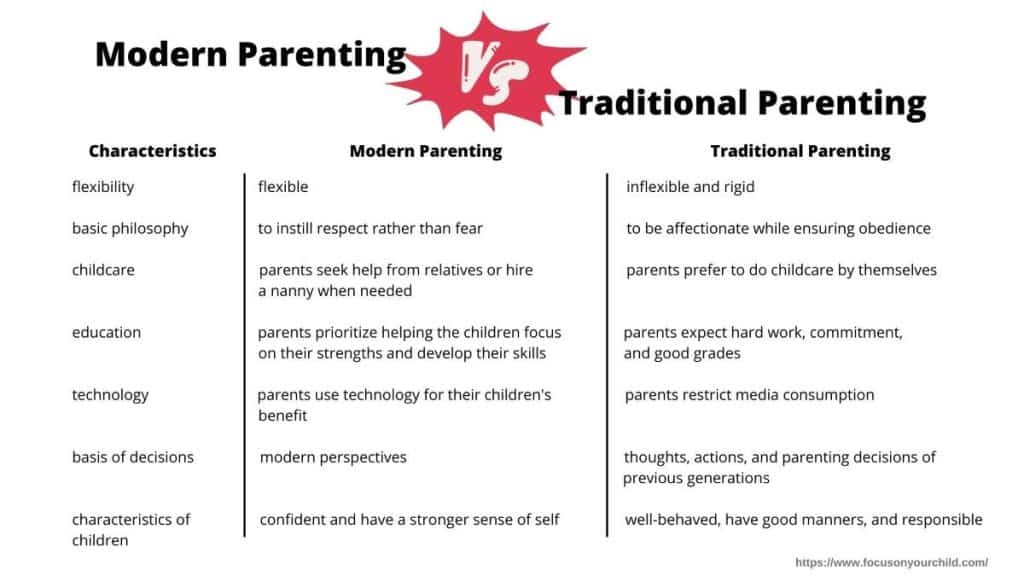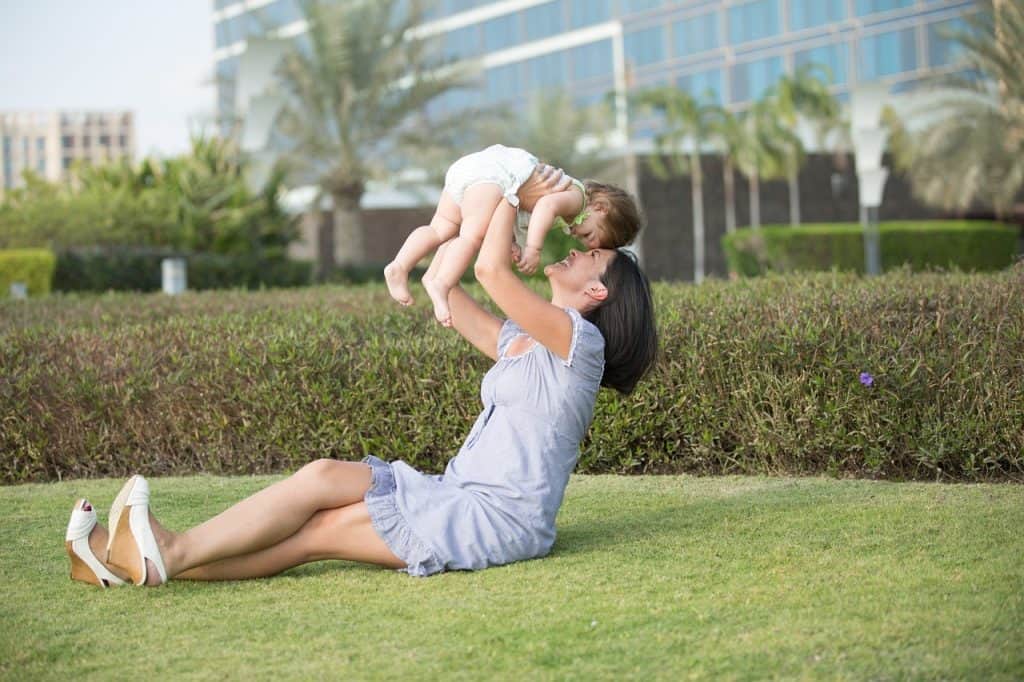Each family has a diverse parenting style. After all, various components influence how parents raise their children. These factors include cultural backgrounds, ethnicities, spiritual ideologies, and socioeconomic status.
Modern and traditional parenting have different characteristics. They have varying views on education, technology, and decision-making. If one wishes to discern the distinctions, various aspects, such as flexibility, basic philosophy, and childcare, are worth considering.
Albeit seemingly contradicting at first, these two primary schools of thought reinforce each other. Modern and traditional parenting have pros and cons, and parents should understand the aspects contributing to these differences.
Differences Between Modern Parenting vs. Traditional Parenting

Parenting styles have changed over time. The line between modern and traditional parenting is getting blurry. There’s a mix-and-match between the two in actual practice, but it helps to make specific distinctions.
1. Flexibility
Traditional parenting focuses on raising responsible, functional, independent, and competent adults with proper education and strict work ethic. One can describe it as a rigid or inflexible parenting style. Traditional parents tend to be more restrictive and put more boundaries in place.
Meanwhile, modern parenting is flexible. It prioritizes the children’s capacity for individual expression through nurturing and involvement. To understand the differences between modern and traditional parenting, it helps to learn about the four main parenting style categories.
Different researchers categorized parenting styles into three or more psychological frameworks. Four categories are widely known: authoritarian, authoritative, permissive, and uninvolved parenting styles.
Traditional parenting has similar characteristics and foundations to an authoritarian style of parenting. In this parenting style, parents enforce a one-way mode of communication. The parents establish the rules which the children must obey at all times.
In most cases, the parents don’t explain the basis of the rules, and the child can’t negotiate. The former expects nothing but complete obedience without mistakes. Errors typically result in punishments.
Parents that incorporate this parenting style have high expectations of their children, and there’s little (to no) room for flexibility. They’re also less nurturing and generally raise the most well-behaved children, primarily because the children know the consequences of ill behavior.
On the other hand, contemporary parenting displays similar traits to authoritative and permissive parenting. Modern parents develop a nurturing relationship with their offspring. They relay their expectations to their children without omitting the principle behind these guidelines.
In authoritative parenting, parents use disciplinary methods as means of support to their children instead of punishment. Communication is a two-way street between parent and child, leaving no room for misunderstanding. Still, this parenting style requires patience and effort from all parties.
Modern parenting also shares similar characteristics with permissive parenting, wherein there are minimal or no expectations for their children. The parents encourage them to explore by themselves and figure things out on their own.
2. Basic Philosophy

The philosophy behind traditional parenting roots in parents’ desire to be compassionate and loving towards their children while ensuring they practice obedience and grow up responsible. Albeit strict and harsh, parents still value their children’s needs.
Meanwhile, modern parenting prioritizes instilling respect rather than fear, which can be the case for conventional parenting. The parents establish themselves as authoritative figures but encourage their children to voice their thoughts and opinions to develop their individuality.
Unlike conventional parents, modern parents understand that every family is unique. They believe there’s no need to conform to old beliefs and traditional parenting methods if it doesn’t work for them and their family.
In other words, modern parents proactively choose what works best for the family regardless of how their parents raised them. They disregard the old system if it doesn’t serve its purpose and are willing to try other methods appropriate for raising their children.
3. Childcare

Circumstances change as time passes. Traditionally, mothers stay at home to take care of their children. In modern times, maternal employment has risen significantly, inevitably leading to a rise in childcare outside of homes (e.g., daycare centers).
Working parents today need to rely on additional support from relatives, nannies, and child caregivers. Many traditional parents oppose sending their children to daycare centers or hiring nannies because they want to keep a careful eye on their children’s growth.
4. Education

Traditional parents give utmost importance to excellent grades and accomplishments. They help their children develop responsibility and work ethic as early as possible.
Modern parents also value good grades and achievements. Still, their primary goal is to equip their children with the necessary skills to traverse the world. They focus on ensuring their children develop their strengths and work on their weaknesses to gain more confidence.
5. Basis of Parenting Decisions
In traditional parenting, the basis of parenting decisions relies on understanding the thoughts and actions of previous generations. Modern parents try to learn new ways of parenting from multiple resources, such as books, blogs, and experiences of other parents.
Modern parents challenge themselves to view things from different perspectives out of genuine love for their children. They believe that changes are necessary as time passes. Meanwhile, traditional parents stick to enforcing conventional rules without room for debate.
6. Technology

Traditional and modern parents have different views on technology. The former worry about their children spending too much time in front of screens, so they tend to restrict media consumption. They say parenting is more difficult today due to social media and smartphones.
Modern parents know when to restrict their children from using screens for entertainment. While some also practice digital ‘grounding’ like traditional parents, they effectively communicate the dos and don’ts of social media consumption to their children.
In addition, modern parents use technology as another tool to help them in parenting and child raising. They understand the pros and cons of technological advancement and use it for their benefit.
7. Characteristics of Children

In modern parenting, parents and their children have a close bond. As mentioned earlier, communication between them is a two-way street. The parents help their children learn about the world by themselves, helping them gain confidence and a stronger sense of individuality.
Meanwhile, children raised by traditional parents have exceptional manners, behave well in social settings, and prioritize formal education to obtain a promising career in the future. They grow into responsible and reliable adults that value good work ethics.
Is Modern Parenting Better than Traditional Parenting?

Parents can argue that modern parenting is better than traditional parenting and vice versa. After all, many factors come into play. Each family has different needs, experiences, beliefs, and cultures. Cultures and traditions are crucial in shaping parenting styles and family dynamics.
According to one research about cultural approaches to parenting, parents primarily shape their parenting style based on indigenous cultural belief systems. The cultural impact is exceptionally significant; parents sometimes act on them instead of their parental instincts.
Not all parents fit into the conventional or contemporary categories. Essentially, both have advantages and disadvantages, and it’s up to the parents to adapt. The best action is to open one’s mind and discern the benefits and drawbacks of each.
Final Thoughts
Comparing modern parenting vs traditional parenting to decide which is bette might be a lost cause because multiple factors come into play. As explained earlier, one example of this is culture. Moreover, the parenting style that works for one family might not work for another.
In other words, there’s no right or wrong way to parent. It’s worth emphasizing that parents shouldn’t force themselves to stick to one parenting style. The best action is determining what works best for their children and the entire family.
